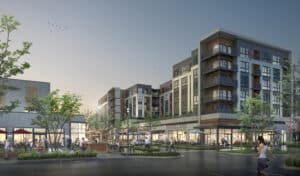
As the coronavirus threatens to speed up malls’ demise, Edens’ plans for hundreds of apartments at the Woburn Mall could offer a prototype for even luxury regional retail centers. Image courtesy of Edens
Traditional brick-and–mortar retail was already in trouble in Massachusetts before the coronavirus crisis hit, with death of smaller, local malls in Hanover, Watertown and Worcester and the proliferation of half–vacant strip centers.
But a hurricane of an economic storm is now headed straight for some of the most successful malls in the region, with Simon Property Group, owner of Copley Place and the North Shore, South Shore, Cape Cod and Burlington malls, among several others, suddenly vulnerable in a way that just a few months ago would have seemed impossible.
Simon Properties is likely to face an array of challenges, from Macy’s decision to jettison some anchor mall locations, to an acceleration of the already–steady move towards online shopping, to an overall retail vacancy rate that could hit near 15 percent before leveling off, Moody’s Analytics notes in a new report, “The COVID-19 Pandemic and the Retail Debacle.”
And as a wave of distress washes over the region, here’s betting the future of these marquee malls may very well involve converting or demolishing retail to make room for one of Greater Boston’s scarcest commodities by far: new housing.
A Future, Suddenly Here
Local malls have been steadily going under for years now, with the ease of online shopping and the rise of regional mega–malls having relentlessly siphoned off shoppers.
And with housing scarce in markets across the country, communities on the outskirts of Philadelphia, Minneapolis, Savannah and elsewhere have been giving a green light to housing construction at smaller, struggling suburban malls.
The same trend has been happening here in Massachusetts.
Sure, there’s the Nouvelle condo high-rise at the Natick Mall – owned by Brookfield Properties, whose continent-spanning retail portfolio now has its own challenges amid the coronavirus emergency – and some apartments at trendy, new lifestyle centers.
But the majority of retail–to–housing projects have been proposed for struggling local malls in Hanover, Woburn and Swansea that shoppers long abandoned.
However, with the coronavirus-driven economic downturn and its one-two punch of social distancing and reduced spending power, that may be about to change, putting some of the big malls into play as well.
Simon’s malls were performing better than many of their counterparts before the crisis, with vacancy rates in the low single digits, Moody’s noted, or about half the national average.
But Simon now finds itself with a large percentage of its malls in states like Massachusetts that have been hardest hit by the coronavirus, meaning delayed reopenings in some of its largest markets
Cracks were starting to show even before the crisis, with Macy’s and other traditional department stores that had long anchored malls having slid into financial distress as more and more shoppers left for the internet.
Under pressure from the coronavirus-driven downturn, those are poised to become gaping fissures.
Luxury retailers like Nordstrom and Neiman Marcus, who had previously helped pick up the slack from the slow-motion implosions of Macy’s and Sears, are now suddenly faced with life–and–death struggles of their own, with Nordstrom warning federal regulators its financial situation may “become distressed” and Neiman reportedly nearing a bankruptcy filing.
Housing Demand Won’t Fade
Simon will face hard choices as some tenants fold and others haggle over the rent, including whether to sell part of the collection of big, upscale malls it assiduously gathered over the years.
But whether it’s under Simon Property, or another owner, the prospect of demolishing retail to make way for housing will suddenly become that much more attractive in the wake of the economic devastation wrought by the coronavirus.
Demand for brick–and–mortar real estate was already on the wane before the crisis hit, and the epidemic and its economic fallout are likely to speed that trend up dramatically.
By contrast, demand for housing isn’t going anywhere anytime soon,
While this downturn will likely result in a decline in home sales, and possibly a big one at that, prices are traditionally “sticky” on the way down, as the late, great Wellesley College economist Chip Case was wont to say, so forget about any big collapse.
And whatever the coronavirus’ short-term economic fallout, the Boston area faced a massive shortfall of hundreds of thousands of homes, apartments and condominiums before the crisis, and that shortage isn’t going anywhere.
If anything, that shortage will only grow worse as demand is bottled up and projects are derailed by this crisis.
The looming troubles at the region’s biggest malls present an historic opportunity for new housing development, and lots of it, in a region where developable land is scarce and most new residential projects are hotly contested by NIMBY local politicians and homeowners.

Scott Van Voorhis
They don’t make new land around here anymore, but millions of square feet of developable space can be found at the Boston area’s largest malls.
No, this is not something that will happen overnight, even with this unprecedented crisis; it’s a trend that could take another decade or so to play out, if it does at all.
But as the coronavirus turns the world as we know it upside–down, and what would have seemed outlandish just a few months ago suddenly doesn’t seem so far-fetched.
Scott Van Voorhis is Banker & Tradesman’s columnist; opinions expressed are his own. He may be reached at sbvanvoorhis@hotmail.com.





